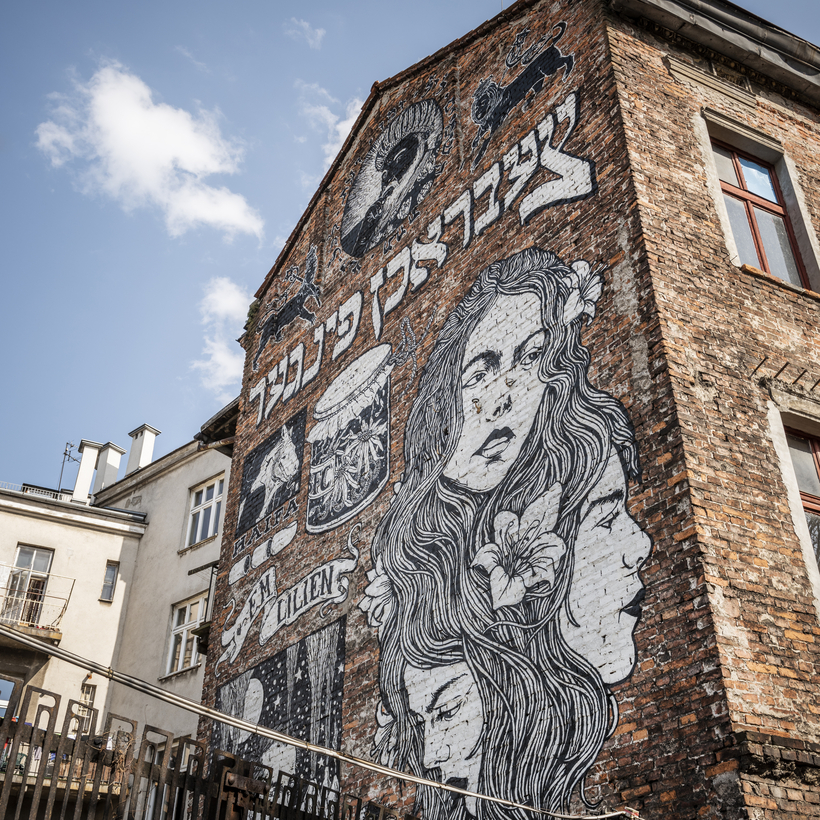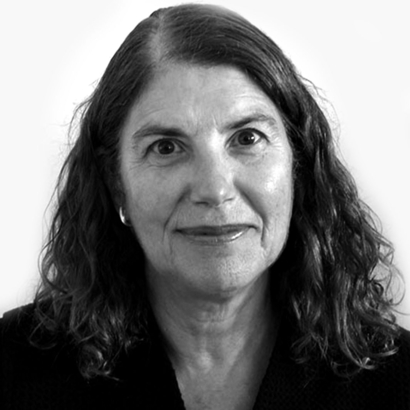An elderly Hasidic rabbi in a tall fur hat shuffled onto the outdoor stage at the Kraków Jewish Culture Festival on a Saturday night in June and proceeded to sing the Hebrew Havdalah blessings that mark the end of the Jewish sabbath. The crowd of thousands that had been rocking to electric klezmer and a Moroccan Jewish band from Israel stood stock-still and stared uncomprehendingly at the rabbi. No one around me joined in singing the melodies familiar to even the least observant Jew. “Do you know what Havdalah is?,” I asked a young blonde Polish girl standing next to me. She shook her head.
Within minutes, the crowd, which jammed the heart of Kraków’s former Jewish quarter, was once again dancing to amplified music at the closing concert of a week-long festival attended by some 30,000—the largest Jewish-culture festival in Europe. One of dozens of such festivals held in Poland every year, Kraków’s, like most others, is organized by Poles who aren’t Jewish.
Philo-Semitism
For an American Jew like myself, these displays of philo-Semitism in Poland can feel surreal. The historic formerly Jewish neighborhood of Kazimierz, which was partially abandoned and crime-ridden when the festival started, in 1988, is now crammed with Jewish-themed cafes and golf carts advertising tours of Schindler’s factory.
“It’s fashionable to have a Jewish friend—like it’s fashionable to have a gay friend,” Genevieve Zubrzycki, a professor of sociology at the University of Michigan who is writing a book about the fashion for all things Jewish in Poland, was told by many non-Jewish Poles she interviewed. Showing an affinity for Jewish culture is much like marching in the recent Gay Pride parade, she said. “What they’re fighting for is a different kind of social order in Poland than one ruled by a right-wing party and the Catholic Church.”

The nation that many American Jews look upon as a Holocaust graveyard (only 10 percent of the more than three million Jews there survived) has been experiencing a highly visible, if small-scale, revival of Jewish life. But more surprisingly, young, non-Jewish Poles are becoming fascinated with Jewish culture at the same time that the country is experiencing an equally visible revival of open anti-Semitism.
“It’s fashionable to have a Jewish friend—like it’s fashionable to have a gay friend.”
As Purim approaches, Poles raised as Catholics will be attending—and sometimes constitute the majority of the attendees at—the parties, costume balls, and plays celebrating Queen Esther’s victorious reversal of a plan to kill all the Jews in Persia 3,000 years ago. At Warsaw’s Lauder-Morasha Jewish day school, all students, including the 60 percent who aren’t Jewish, will learn about Purim in Jewish-culture classes, participate in a Purim costume party, and listen to a retelling of the Book of Esther by Polish actors. Non-Jewish families regularly make up 99 percent of the more than 200 participants at the Family Purim Ball and other Purim festivities at the POLIN Museum of the History of Polish Jews in Warsaw, according to a museum spokesperson.The Purim party at Kraków’s Jewish Community Center will be made possible by some of the 70 non-Jews who form the Center’s core volunteer staff.
And many events will likely include young Poles who wonder if they are Jewish. About 70 percent of those who participate in Warsaw’s Hillel, a Jewish student organization, were raised unaware of their Jewish roots and only recently discovered the existence of Jewish forbears, according to executive director Magda Dorosz.
During a recent week-long visit to Poland, the young people I met who were volunteering at Jewish community centers or considering conversion to Judaism often mentioned their disillusionment with the Catholic Church in Poland, currently the focus of a child-sex-abuse scandal, and being repulsed by anti-Semitism. But more often I heard about a nostalgia for a culture they never knew or a desire to explore a more distinctive identity than they see around them.
“There would be no Jewish revival in Poland without non-Jews,” Kaja Siczek, who coordinates Jewish teen activities at the Warsaw Jewish community center, told me. Partly this is because there just aren’t enough Jews to staff all the festivals, Jewish-holiday dinners, and Jewish community centers. Estimates of the number of Jews in Poland range from 7,000 who self-identify as Jews to as many as 100,000 if everyone with a Jewish grandparent were included. Yet the communities are tiny if you count only those active in synagogues or Jewish community centers—some 700 families in Warsaw, according to Poland’s American-born chief rabbi, Michael Schudrich, with about 700 active members in Kraków, and only around 200 in Lodz.
“There would be no Jewish revival in Poland without non-Jews.”
Non-Jews make up the overwhelming majority of volunteers restoring the neglected Jewish cemeteries in Lodz and other Polish towns and cities. They account for most of those attending some 40 annual festivals around the country designed to highlight Jewish life as it once existed in Poland.
Judaism is attractive to young people in Poland’s overwhelmingly white, Catholic population partly because it is “exotic,” Zubrzycki said, “but not too exotic,” since many Jewish and Polish food and music traditions overlap. Rabbi Schudrich sees an analogy to the fascination of some young Americans with the culture of Native Americans, another people who were almost wiped out.

“I think we’re interested in Jewish culture because Jewish people were part of Poland’s history and culture and suddenly they disappeared,” said Zuzanna Porębowicz, 34, a Montessori teacher who took a course in Hebrew in Warsaw. She said many of her contemporaries were learning Hebrew, visiting Israel, or searching for Jewish family roots. “A lot of us younger people feel that something is missing, and we are looking for that part that is missing.”
Post-Communist Mystique
For some, that translates to a yearning for a pre-war Poland that was more cosmopolitan and multicultural than the towns where they’ve grown up, now devoid of their Jewish populations. Agata Klakowicz, 30, who volunteers part-time at the J.C.C. in Kraków, mentioned a pre-war ballad about strolling through Polish streets hearing snatches of Yiddish and other foreign languages. “I have some kind of sadness that we don’t live in a society so interesting and diverse,” she said.
The fact that the history of Jews in Poland was suppressed so long under Communism has also added to its mystique. Janusz Makuch, founder of the Kraków festival, who was born in 1960 and raised under Communism, says he was shocked to learn that his hometown of Pulawy had once been one-third Jewish.
Makuch was a university student when he first met Jews in Kraków’s old Jewish quarter of Kazimierz. He began to learn Hebrew and Yiddish in an informal study group that also celebrated Jewish holidays. In an interview laced with Yiddish and Hebrew, he told me that though he comes from a “half-Catholic, half-Communist” family and never converted, “I’m one of you.” (His address to a group of American Jews visiting the festival was so conversant in Jewish humor and references that he sounded like a Borscht-belt comedian.)
“Without Jews we [in Poland] are no one. My identity is like an empty vessel,” said Makuch, who dons a kippah (Jewish skullcap) to introduce the closing concert. The festival, he said, is “building the Polish future in Kraków”—a future for Jewish and Christian Poles together.
Some Jews in Poland are skeptical that Jewish cultural events will lead to Makuch’s ideal of coexistence. Particularly in smaller towns, the festivals tend to stereotype Jewish life, with performers dressed up as black-hatted Hasidic Jews complete with plastic sidelocks, oblivious, according to critics, of the far more worldly circles of Yiddish-speaking and Polish Jewish intellectuals that existed before the war.
“There are very few Jews left, so Poles took it on themselves to create this missing culture. They are just presenting us as folklore, as Fiddlers on the Roof,” said Anna Zielinska, 43, who lives in Warsaw and advises an NGO that combats anti-Semitism. This “folk bubble,” she said, reinforces stereotypes. “That’s why they don’t bear fruit in combating intolerance against Jews.”
Such festivals permit Poles to create a “self-serving and safe narrative about the Jewish past … and allow Poles to stage themselves as good people, loving Jews,” said Elzbieta Janicka, a literary historian at the Polish Academy of Sciences’ Institute of Slavic Studies, in Warsaw. Her book Philo-Semitic Violence? argues that this falsely harmonious version of history is a way for Poles to avoid responsibility for anti-Semitism and their role in the pogroms before, during, and after the Holocaust.
“They are just presenting us as folklore, as Fiddlers on the Roof.”
At a recent anti-Jewish demonstration in Warsaw protesting restitution to Polish Jews, a man wore a shirt saying, I will not apologize for Jedwabne, the town where Polish Jews were massacred by their Polish neighbors in 1941 under the German occupation.

In a small Jewish community like Kraków’s, some members are suspected of inventing Jewish roots—one sign that being Jewish has cachet. People hire genealogists in their desperation to find Jewish ancestors even where there’s little likelihood of a historical link, one such researcher told me. “Something about the meaning of Jewishness has changed profoundly in the last couple of decades,” Zubrzycki said of this trend. “Instead of hiding Jewish roots, you hope to find some.”
The Self-Chosen People
Katka Reszke, author of The Return of the Jew, a 2013 book about young Poles who have discovered they’re Jewish, could once have been considered one such “wannabe Jew.” As a 15-year-old growing up in a Catholic household in Wroclaw, Poland, she had a “hunch” she was Jewish despite no obvious family history. She converted to Judaism in her 20s. Like many young Polish Jews, she says she didn’t discover she had Jewish roots until her 30s, when her mother revealed a deathbed confession from Reszke’s great-grandmother that she was Jewish, sealed with a vow of secrecy. Reszke is now writing a book about other young Poles she’s found who acted on similar intuition. It’s titled The Meshugene Effect, after the Yiddish word for “crazy,” which her great-grandmother used as a term of endearment for her as a child but which Reszke didn’t realize was Yiddish until much later.
“Instead of hiding Jewish roots, you hope to find some.”
Rabbi Schudrich explains Reszke’s intuition as something speaking to her from her “Jewish soul.” Reszke suggests such hunches may arise from intergenerational trauma, or “how haunted the land is” by its missing Jews.
Patrycja Molko, 24, who is studying Jewish history at Jagiellonian University in Kraków and volunteers at the local Jewish community center, wonders if she is an example of the “meshugene effect.” Raised Catholic, she said she fell in love with Jewish culture, calls the J.C.C. her “second home,” and wants to live in Israel. “I have a strange feeling this happened for a reason,” she said, adding that she “wouldn’t be surprised” if by next year she discovers she has Jewish roots.
Sarah Glazer is a journalist based in New York City and a contributing writer for CQ Researcher


